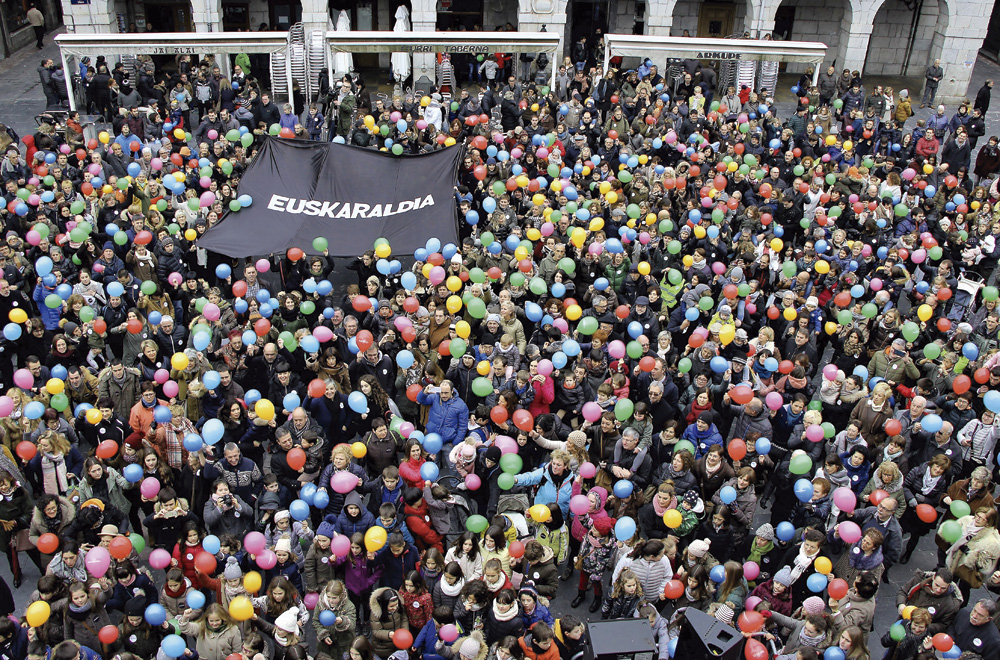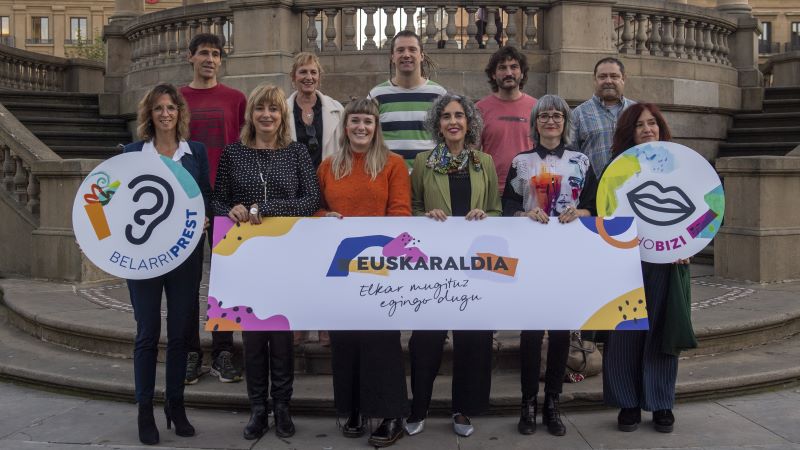Experiment to change language habits
- The initiative will take place between 23 November and 3 December. The organization is run by the Basque Government, the Government of Navarre, the Basque College, the Public Office of the Basque Country and Euskaltzaleen Topagunea.Segall their data, more than 60,000 people have registered.

Euskaraldia wants to influence the use of Euskera: 11 days of activities in Basque. The leading role will fall on individuals. The aim of the initiative is for each person to reflect on his/her linguistic habits, on when he/she speaks in Basque, when not, with whom yes, with whom no... Once aware of this, Euskaraldia proposes an exercise to do as many activities as possible in Euskera. Each of the speakers can put challenges or commitments: I do not speak in Basque with that Basque friend, because this time I will try to do interviews in Basque; I have the habit of speaking in Spanish to a stranger, because now I start talking in Basque; among the friends there is only one who does not speak in Basque and we always do it in Spanish, because next time I will try to keep the Basque because I know that Spanish understands Spanish. That individual who will try to speak in Basque whenever he can, will play a role, that is, it will be a whim. Those who do not speak Basque will also have their place in Euskaraldia. If they are able to understand Euskera they will have the role of belarriprest and their role will be to ask them to do so in Euskera. The two roles, drowning and belarriprest will wear an identifying veneer on the chest. The exercise to change language habits is the task of each one, but the organizers have wanted to create a welcoming and welcoming environment.
More than 60,000 Basques have signed up for drowning or belarriprest. According to the count of the end of October, 45% are Gipuzkoans, 31% Biscayan, 12% Navarros, 9% Alaveses, 2% labortans, and 1%, Bajonavarros and Suletins. Drowning will be more than belarriprest.
The Sociolinguistic Cluster will analyze the influence that the 11-day exercise has had on the linguistic customs of the participants. The participants shall complete three questionnaires: A few days before the beginning of Euskaraldia, a few days after the end; and in March 2019.
The seed germinated in the neighborhood of Egia
The Egia Euskaraz Commission of Donostia-San Sebastián decided that it should carry out a practical exercise in the neighborhood for the Euskaldunes. The neighbors have taken a look at the experiment. We have brought here the main features of four of these initiatives. In addition, many other activities have been carried out in the Basque Country. Some of these include: Barrio Añorga (Donostia), Donostiako Piratak, Astigarraga, Arrigorriaga, Aiaraldea, Trapagaran, Barrio Deusto de Bilbao, Derio, Baiona-Angelu - Biarritz, Oarsoaldea, Zuia, Estella, Tolosa, UPV (Leioa).
In Egia Euskaraz Bizi Nahi Dugu (Egia District, Donostia)

When: January-February-March 2016.
Home: It was the first initiative that was carried out in this way to activate the Euskaldunes and use it on a daily basis. They were based on the performance of the artist Lutxo Egia. Lutxo Egia spent a whole month in Bilbao speaking only in Basque.
Objective: To live for a week in Basque, to keep the Basque as much as possible. The initiative was aimed at the Basques. Castellanospeakers and passive Vasco-speakers were asked not to ask for language change. They told the merchants what they were going to do.
How: For eight weeks, one-week shifts were distributed. The first seven rounds involved agents or groups, and the eighth involved individuals.
Sheet metal: The participants carried a sheet of Euskaraz Bizi Nahi Dugu on their chest.
Organises: Commission of the Basque Country.
Financing: Commission Egia Euskaraz, Euskera Service of the City Hall of Donostia and Donostia Kultura.
Euskera ari du (Hernani)

When: October-November 2016.
Objective: Speak in Basque whenever possible and with all those who can. The proposal was that the one who usually speaks Basque did not do so in Basque with what he did not have a habit and the one who does not know how to speak did not do so in Spanish. Those who didn't understand had been told what the wager was.
How: Shifts were performed from one week to six weeks. Individuals and groups participated.
Participants: 1,800, mainly Basques and some passive Basques.
The identifying veneer was distributed, but also acted without veneer.
Organise: Euskalgintza, Euskera Service of Hernani City Hall and schools.
Financing: Hernani City Hall.
Baietz 40 Euskaraz (Lasarte-Oria)

When: October-November-December 2016.
How: They created two figures. Belarriprest, as the Basque Country understood, invited others to use it. Ahobizia would keep the challenge of living in Basque for a week. They were relieved for six weeks.
Veneers: There were chaps of belarriprest and ahobizi. The one who had been yawn for a week caught a splash in the next few weeks. Those who decided to be belarriprest took the veneer for 40 days.
Ahobizi: Two commitments were made: One, that everything that is understood in Basque should be done in Basque, and another, that the first word should be spoken in Basque.
Participants: They were all individuals. 947 ahobizi and 1,927 belarriprest
Research: The Ahobizi formed a list with the members of the house, friends, coworkers or acquaintances that they themselves had chosen. The challenge was to work in Basque for a week. The participants were asked three times about the use of Euskera. Before the challenge began, 62.4%; after a week of challenge, use increased to 83.8% and at three months was 81.3%.
Organise: Basque Service of the City of Lasarte-Oria and Cultural Association Ttakun.
Financing: City Hall of Lasarte-Oria.
75 hours in Basque (Salvatierra)

When: From 8 to 11 November 2016
Objective: Empowering and activating Euskaldunes, that is, influencing individual linguistic behaviors.
How: They'd done two campaigns. “Nik 75” for Euskaldunes and “Guk 75” for Castellanospeakers. Request the Castilian speakers: even if you do not understand everything, make the effort to understand the other and do not ask the Basque to pass immediately to Castilian.
Sheet metal: “I’ve made my decision! The Basques carried the identifying veneer “Nik 75”.
Participants: 284 people signed the “Nik 75” commitment. No signature was requested in the “Guk 75” campaign. The agreement was signed by nine entities, 84 establishments and 40 groups.
Asking the participants: 86% of the respondents expressed their intention to continue in the relationships that have already been won in Euskera. 80% of respondents said they had done the first word in Euskera, but 20% of those who did the second word in Euskera.
Organises: Volunteer group of 20 people.
Financing: The Basque association of Salvatierra Olbea donated an amount of money and the rest came out of t-shirts, pintxos and activities.
Euskaraldia comes back. Apparently, it will be in the spring of next year. They have already presented it and the truth is that it has surprised me; not Euskaraldia himself, but his motto: We'll do it by moving around.
The first time I have read or heard it, the title of the... [+]
The Basque country is about to finish writing these lines, the end is still insufficient. They will certainly be beautiful, similar to those of a great party.
In Bizkitarte I have carefully read, here or in other publications, lines written by people more expert than I, let us... [+]
On November 18, the “Euskaraldia” began, an initiative that aims to promote the use of Euskera among Basque speakers and non-Basque speakers for two weeks. Although I believe that this initiative has shortcomings in some contexts and there is no better veneer than “Good... [+]
Ariketa kolektibo bat egingo du Gazte Euskaltzaleen sareak azaroaren 14tik 18ra, gazteen artean euskaraz bizitzeko hautua bultzatzeko eta horretarako oztopo diren "egiturazko baldintzak" azaleratzeko.




















